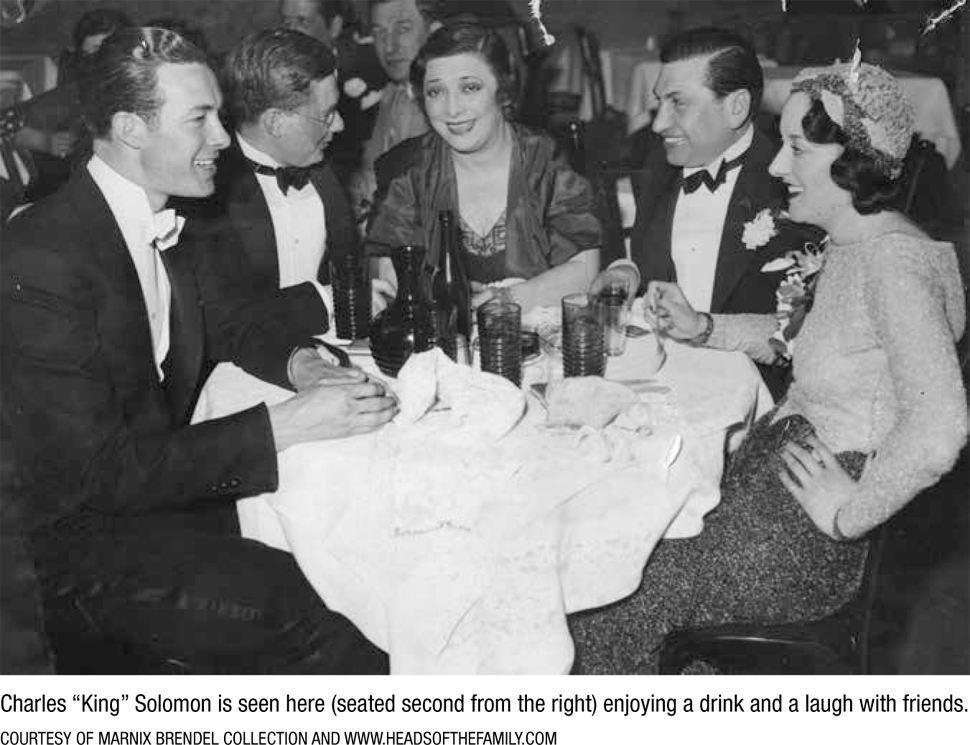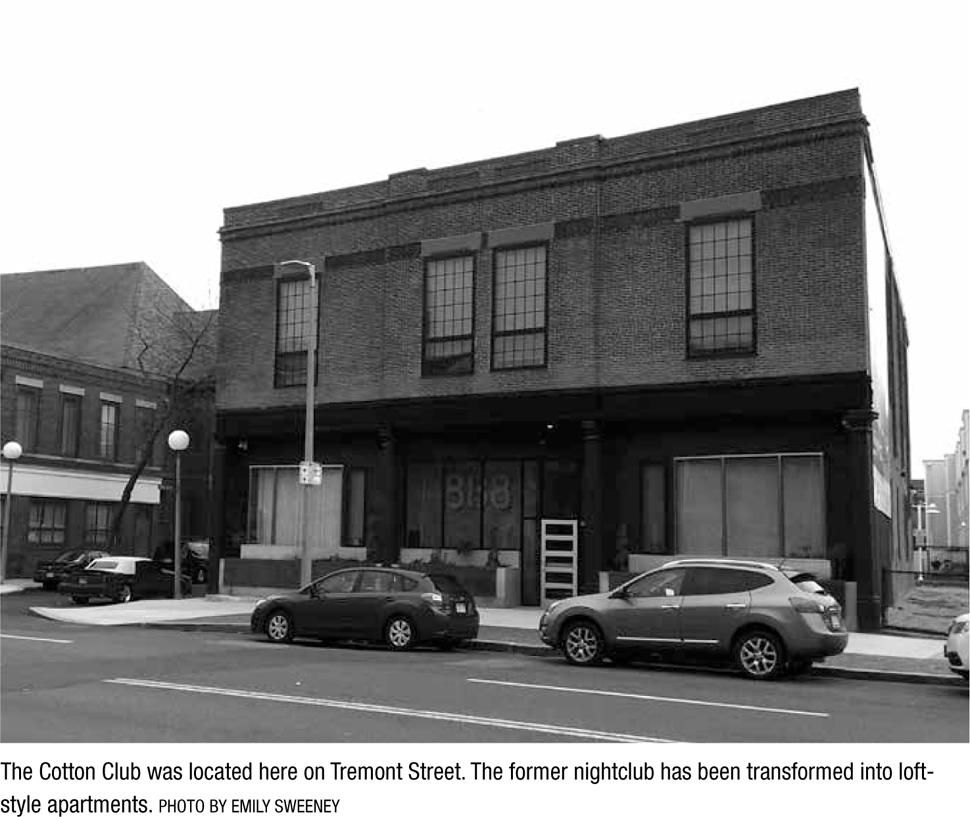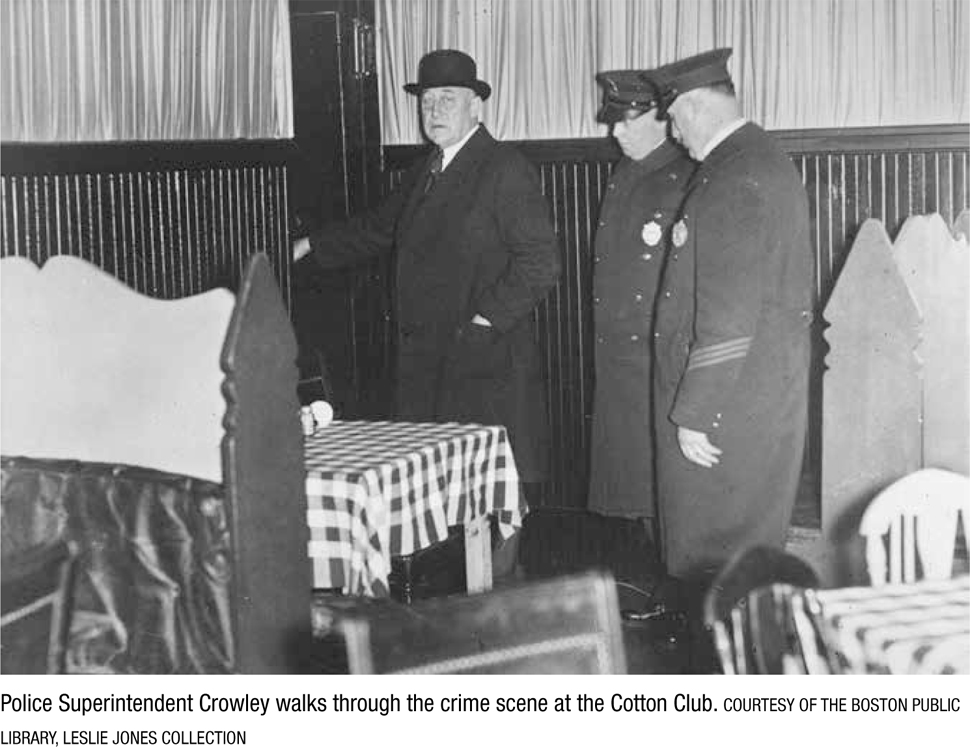
CHAPTER TWENTY
Charles “King” Solomon was a suave businessman and theater owner who became known to the feds as “the Capone of the East.” He reportedly attended the infamous Atlantic City conference in May 1929, along with Meyer Lansky, Al Capone, Lucky Luciano, Frank Costello, and Bugsy Siegel.
Solomon wasn’t born into wealth. He went from serving hot dogs behind a lunch counter to amassing a fortune by selling narcotics and bootlegging. He used his riches to buy a nice home in Brookline and the Cocoanut Grove nightclub at 17 Piedmont Street.

In his book The Rise and Fall of the Jewish Gangster, Albert Fried notes that Solomon, Hyman Abrams, Joseph Linsey, and Louis Fox were part of “the wealthiest liquor syndicate ever built up in New England.”
Abrams was an avid investor who put his money into places like the Flamingo hotel and the Sands resort in Las Vegas (Frank Sinatra also owned a minor share in the Sands), and Meyer Lansky’s Hotel Havana Riviera in Cuba. Fox was a prominent sportsman and philanthropist from Revere, and Linsey was a bootlegger turned businessman who became a liquor wholesaler after Prohibition ended.
Solomon was the first in the syndicate to die.
In the early morning hours of January 24, 1933, after the Cocoanut Grove closed for the night, Solomon headed to the Cotton Club at 892-894 Tremont Street, which was an after-hours joint just over a mile away. One of Solomon’s good friends, Dan Carroll, reportedly owned the club as a silent partner. Solomon’s chauffeur drove him to the club, where he sat at a table with two Cocoanut Grove dancers and the club’s orchestra leader.
Just a few weeks earlier, a federal grand jury in New York indicted Solomon and three other men on charges of conspiring to violate the National Prohibition Act. Along with James F. Murphy of New York and Al and William Lillien of New Jersey, Solomon was accused of running a huge smuggling syndicate and operating illegal radio stations to communicate with the ships on Rum Row to coordinate deliveries of liquor. Solomon turned himself in to federal authorities in Boston and easily posted his $5,000 bail. He denied any wrongdoing, and told the press that the charges were the result of a smear campaign being carried out by his enemies.

That night at the Cotton Club, Solomon rose from his seat and walked into the men’s room. The sound of gunshots suddenly echoed off the walls and bullets tore through Solomon’s arm, chest, and abdomen. He reportedly staggered out from the bathroom, clutching his bleeding wounds, and muttered, “Those dirty rats got me.” He was forty-six years old.
Michael Rocco, better known as “Mickey the Wiseguy,” was a top lieutenant of Solomon’s. At the time of Solomon’s murder, Rocco was still living with his parents in the “The Gothic” apartment building in the West End. Throughout the 1920s Rocco listed his occupation as a taxi driver, or chauffeur. In the 1930s he listed his occupation as a salesman. But in reality, Rocco was a jetsetter. He was reportedly in Florida when Solomon was killed, and he flew back to Boston when he heard the news. Commercial flight was still in its infancy back then, and an expensive mode of transport that only the wealthy could afford. Planes flew at low altitudes, so turbulence was common. Cabins weren’t pressurized back then, either. For Rocco, the trip home was probably a bumpy ride.

Solomon’s funeral was January 26, 1933. The wake was held at his home at 193 Fuller Street in Brookline, where hundreds of curiosity seekers gathered outside. Inside, flowers were everywhere and Solomon lay in a coffin dressed in a blue double-breasted jacket, and a gray and blue tie. Boxing promoter Dan Carroll, attorney Barney Welansky, and David “Beano” Breen were among the many visitors who paid their respects. Tommy Maren, the manager of the Cotton Club, was there, too.
Solomon was buried at the Hand-in-Hand Jewish Cemetery in West Roxbury. Four days later, on January 30, 1933, Michael J. “Spike” Hennessey appeared in Roxbury District Court as a material witness. Seated among the spectators in the courtroom was Michael Rocco, who watched the proceedings silently. Hennessey was now being held on $20,000 bail.
Hennessey denied being anywhere near the Cotton Club on the night of Solomon’s murder. Police had wanted to charge him with the murder, but the judge refused to issue a warrant due to lack of evidence—and the fact that Cotton Club employees couldn’t place him at the scene of the crime.
A few days later, Danny Walsh, one of Solomon’s bootlegging associates in Rhode Island, disappeared. Walsh was last seen alive on February 2 having supper at the Bank Cafe in Pawtuxet Village. Rumors floated around the underworld that Walsh’s enemies put his feet in concrete and dumped him in the ocean. On March 23, Al Lillien, another of King Solomon’s bootlegging business partners, turned up dead. Lillien and his brother had been indicted with Solomon in January, just a few weeks before Solomon was murdered. Lillien was killed in a New Jersey mansion that overlooked the Atlantic Highlands (and was once owned by Oscar Hammerstein). He had been shot three times in the head. A pair of pall-bearer’s gloves and an upturned playing card—the king of spades—was reportedly found near his body. The assassination of Lillien and the disappearance of Walsh remained unsolved, although Walsh did make the headlines in December 2016 when a construction crew laying down a foundation for a new house in South Kingston, Rhode Island, unearthed some human remains. The property on Matunuck School House Road was once owned by the Walsh family, which led locals to wonder, was this the final resting place of the legendary, long-missing Prohibition-era bootlegger?
Approximately two dozen bones were recovered. Among them were two skulls and three jaw bones. The state archaeologist confirmed that the coffin hardware found with the bones dated back to the mid-1800s. It turned out that the builders had stumbled upon a nineteenth-century grave plot, and the bones could not have belonged to Walsh.

Mystery also surrounded Charles Solomon’s murder. Police had initially wanted to charge Spike Hennessey with the murder, but he was only held as a material witness and was ultimately released.
The New York Times reported that Assistant US Attorney Leonard Green-stone believed that Solomon was killed by people who feared he would talk and cooperate with authorities. “I believe Boston Charlie was put on the spot to seal his lips,” said Greenstone. “I have reason to believe that persons connected with the operation of the run ring, which operated a fleet of vessels between Canadian and European ports and maintained illicit radio stations along the Atlantic coast feared if Solomon returned to Brooklyn he would give information against them.”
Solomon’s murder was pegged on a group of young men with no known gang connections. Two of the suspects—John Burke and Frank Karlonas—were acquitted.
James Scully was acquitted of murder but convicted of robbing Solomon and sentenced to sixteen to twenty years in prison. John O’Donnell was convicted of being an accessory after the fact to the robbery and sentenced to five to seven years. James “Skeets” Coyne, an ex-con and former Cotton Club doorman, was captured in Indiana in March 1934. Coyne later pleaded guilty to manslaughter and robbery and was sentenced to ten to twenty years.
Speculation abounded over who orchestrated Solomon’s murder. Some in law enforcement assumed Solomon was put on the spot by Mafia leaders in the North End. But author Stephanie Schorow points out that the suspects checked their coats in at the door—not the smoothest move if they were planning to make a quick getaway. So perhaps it may have been a crime of opportunity, or a botched robbery gone bad? Whatever the reason, some people benefited financially from Solomon’s death.
Soon after Solomon was murdered, one of his lawyers, Barney Welansky, took ownership of the Cocoanut Grove nightclub, and Michael Rocco gained more power and more wealth. The following year Rocco and his parents moved to a newly built single-family home at 15 Thurston Street in East Boston.